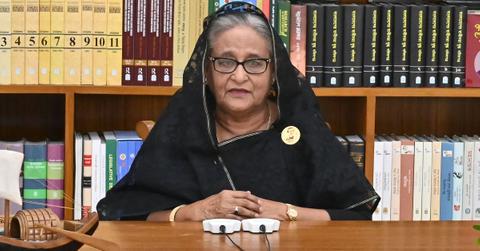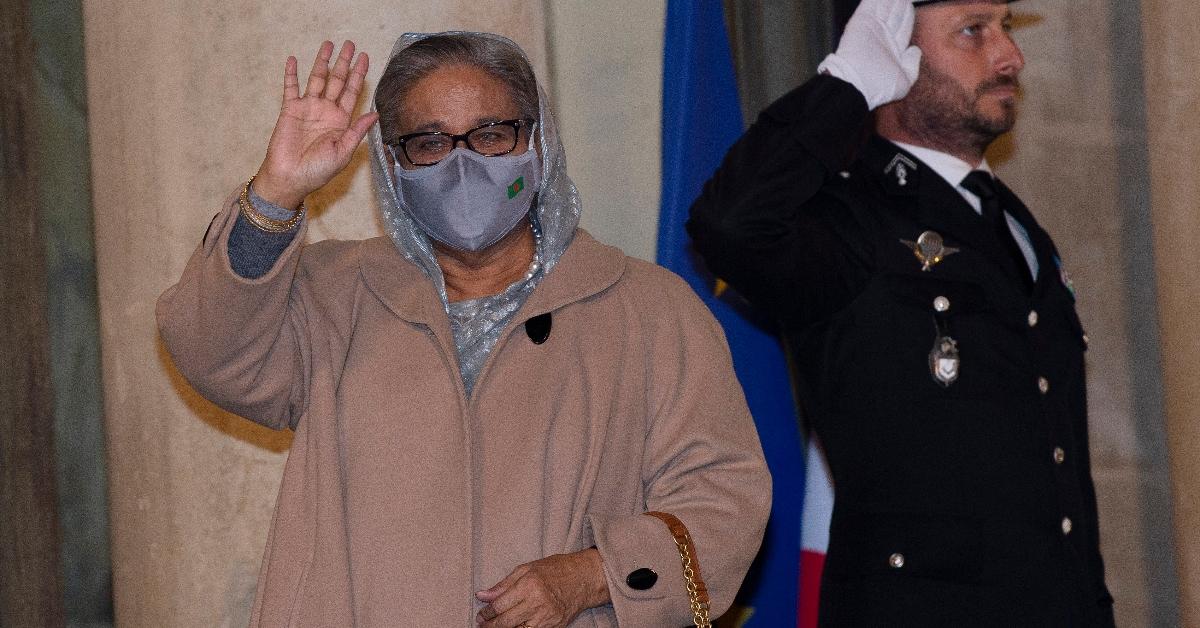Sheikh Hasina Has Been Sentenced to Death by a Bangladesh Tribunal for Crimes Against Humanity
"We lost control of the situation, but to characterize what happened as a premeditated assault on citizens is simply to misread the facts."
Published Nov. 17 2025, 1:26 p.m. ET

In October 2024, The Law and Political Economy Project spoke with legal scholar Chaumtoli Huq about the student-led protest movement in Bangladesh that started a few months prior in June.
The deadly protests were kicked off after the "Supreme Court of Bangladesh reinstated a quota that reserved 30 percent of civil services jobs for descendants of those who fought in the Liberation War."
The Supreme Court's decision served as a form of "political patronage" that would consolidate the power of then-Prime Minister Sheikh Hasina’s regime.
According to NPR, decisions made by PM Hasina led to the deaths of more than 800 people, as reported by the country's health adviser under the current interim government.
In August 2024, she fled to India. Where is Sheikh Hasina now? Here's what we know.

Where is former Bangladesh Prime Minister Sheikh Hasina now?
Hasina and a top aide, former Home Minister Asaduzzaman Khan, are still in India. In November 2025, the International Crimes Tribunal based in Dhaka, the capital of Bangladesh, sentenced Hasina and Khan to death for crimes against humanity. They were sentenced in absentia.
When the death sentences were announced, cheers and clapping erupted in the courtroom, reports NBC News. The sentences can be appealed in the Supreme Court, but Hasina and Khan would have to be arrested or surrender within 30 days of the judgment.
Hasina's son, Sajeeb Wazed, told Reuters they would only appeal if a "democratically elected government took office with the Awami League’s participation."
Prosecutors presented evidence in court that Hasina directly commanded that lethal force be used on the student-led protests. A separate United Nations report revealed that as many as 1,400 people might have been killed during the uprising.
Hasina responds to the charges, calls them "unjustified."
In a statement obtained by NPR, Hasina said the charges were unjustified.
"We lost control of the situation, but to characterize what happened as a premeditated assault on citizens is simply to misread the facts," she said. "I mourn all of the deaths that occurred in July and August of last year, on both sides of the political divide. But neither I nor other political leaders ordered the killing of protesters."
Bangladesh's Ministry of Home Affairs requested that Hasina and Khan be returned to Bangladesh.
"As a close neighbor, India remains committed to the best interests of people of Bangladesh, including in peace, democracy, inclusion, and stability in that country," per a statement from India's foreign ministry. "We will always engage constructively with all stakeholders to that end."
An arrest warrant was issued by the International Crimes Tribunal (ICT) for Hasina and Khan, per The New Indian Express. Under Articles 1 and 2 of the India-Bangladesh Extradition Treaty, a "request can only be made if the individual has been charged, accused, or convicted of an extraditable offense."
However, this depends on whether or not the offense is punishable under the domestic laws of both countries. India could interpret the charges differently.